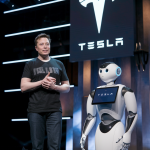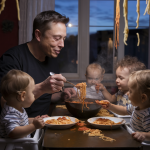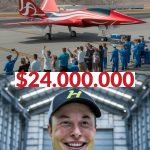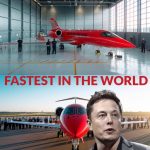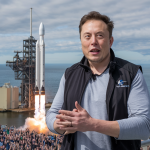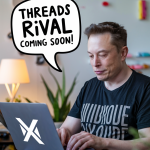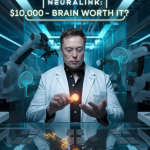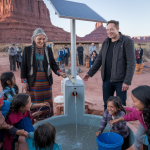How a Laptop Gift from Elon Musk Transformed a Boy’s Future: A Journey from Dreams to Code
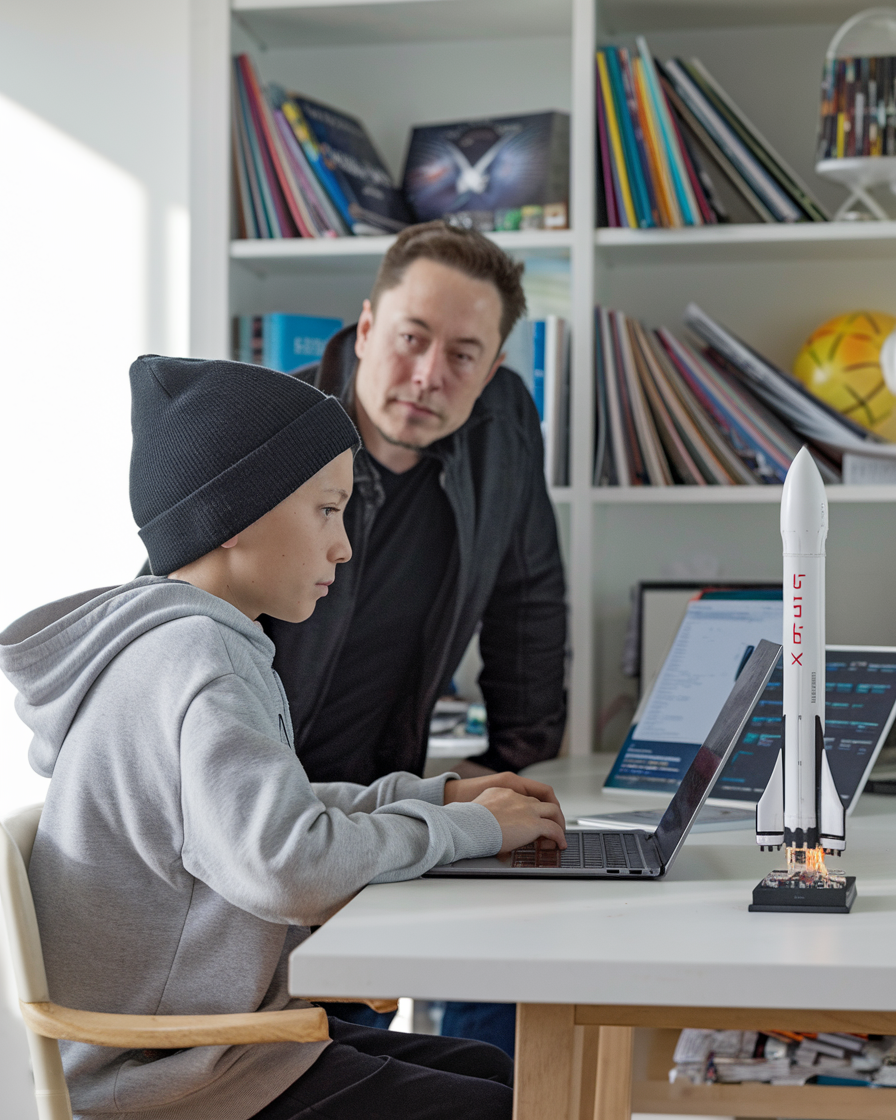
In a world increasingly driven by technology, access to tools like laptops can unlock endless possibilities. For one young boy, whose dreams were once confined by a lack of resources, a single act of kindness changed everything. When Elon Musk gifted him a laptop, it wasn’t just a device—it was a gateway to a brighter future. Today, that boy is coding his first program, inspired by Musk’s legacy in technology and innovation. This heartwarming story showcases the power of opportunity, the impact of generosity, and the potential of young minds when given the right tools.
The Power of a Dream Without Limits
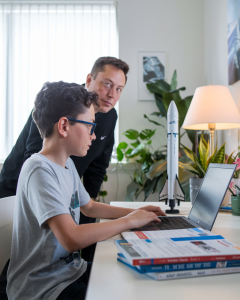
Every child dreams of what they could become, but for many, those dreams are stifled by circumstance. In a small village far from the bustling tech hubs of Silicon Valley, a boy named Kofi (name changed for privacy) grew up with a curious mind and a passion for learning. He was fascinated by stories of rockets soaring into space, electric cars revolutionizing transportation, and artificial intelligence shaping the future. These tales often centered around one name: Elon Musk.
Kofi’s imagination was boundless, but his access to technology was not. In his community, electricity was unreliable, and computers were a rare luxury. The nearest school had only a handful of outdated textbooks, and the concept of coding or programming felt like a distant fantasy. Yet, Kofi’s curiosity persisted. He sketched designs for futuristic machines in the dirt and asked endless questions about how things worked. His teachers recognized his potential but lamented the lack of resources to nurture it.
This is a familiar story for millions of children worldwide. According to UNESCO, over 260 million children lack access to basic education, and even more are deprived of digital tools that are now essential for success in the modern world. The digital divide remains a significant barrier, particularly in underserved regions where access to technology could transform lives.
A Life-Changing Gift
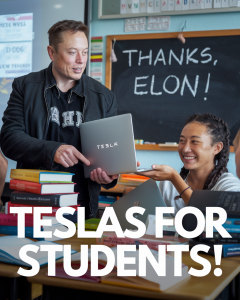
Everything changed for Kofi when a local nonprofit partnered with a global initiative to distribute laptops to students in need. The program aimed to bridge the digital divide by providing young learners with the tools to explore technology. Among the supporters of this initiative was none other than Elon Musk, whose commitment to education and innovation extends beyond his well-known ventures like Tesla, SpaceX, and Neuralink.
One sunny afternoon, Kofi was called to the community center, where a small crowd had gathered. To his astonishment, he was handed a sleek, brand-new laptop—a gift that felt like a miracle. The device was more than just hardware; it was a symbol of possibility, a key to unlocking the world of knowledge he had always yearned to explore. The laptop came preloaded with educational software, including coding platforms, tutorials, and resources to learn about STEM (Science, Technology, Engineering, and Math).
Kofi’s eyes lit up as he powered on the laptop for the first time. The screen glowed with promise, and he felt a surge of excitement mixed with determination. He knew this was his chance to turn his dreams into reality.
The First Steps into Coding
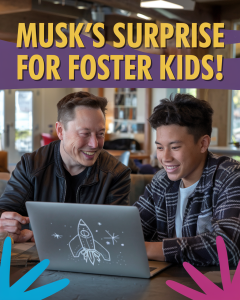
For Kofi, the laptop was a portal to a new universe. He began exploring the pre-installed coding programs, starting with simple platforms like Scratch and Code.org. These tools are designed to make programming accessible to beginners, using visual blocks to teach the logic of coding without overwhelming new learners. Kofi was hooked from the start.
His first project was a simple game—a maze where a character had to collect stars while avoiding obstacles. It wasn’t perfect, but to Kofi, it was a masterpiece. Each line of code he wrote felt like a step closer to understanding the technology that powers the world. He spent hours experimenting, debugging, and learning from his mistakes. The laptop gave him the freedom to fail, try again, and grow—a luxury he had never had before.
Kofi’s progress didn’t go unnoticed. His teachers marveled at his dedication, and the nonprofit provided virtual mentors to guide him. These mentors introduced him to Python, a versatile programming language used by developers worldwide. With each lesson, Kofi’s confidence grew. He began dreaming of creating apps, designing websites, and even contributing to projects that could solve problems in his community, like improving access to clean water or education.
Elon Musk’s Legacy of Inspiration
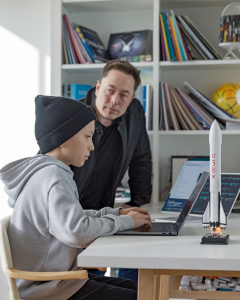
Kofi’s journey is deeply tied to the influence of Elon Musk, whose vision for the future has inspired millions. Musk’s companies—SpaceX, Tesla, Neuralink, and The Boring Company—are built on the idea that technology can solve humanity’s greatest challenges. From colonizing Mars to reducing carbon emissions, Musk’s work demonstrates what’s possible when innovation meets determination.
But Musk’s impact goes beyond his businesses. His commitment to education and philanthropy has quietly transformed lives, often in ways that don’t make headlines. Initiatives like the one that reached Kofi reflect Musk’s belief that empowering the next generation is key to progress. By supporting programs that provide technology to underserved communities, Musk is helping create a world where talent, not circumstance, determines success.
For Kofi, Musk is more than a distant figure; he’s a role model. “I want to build something amazing, like Elon,” Kofi says, his eyes gleaming with ambition. “I want to use technology to help people.” Whether it’s designing a solar-powered device for his village or coding an app to connect students with teachers, Kofi’s dreams are now within reach.
Bridging the Digital Divide
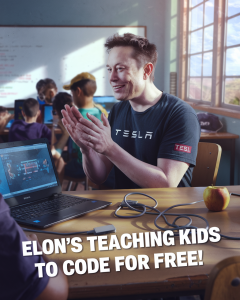
Kofi’s story is a powerful reminder of the importance of closing the digital divide. Access to technology is no longer a luxury—it’s a necessity. In today’s economy, skills like coding, data analysis, and digital literacy are critical for success. Yet, millions of children remain cut off from these opportunities, trapped by poverty, geography, or lack of infrastructure.
Organizations worldwide are working to change this. Programs like One Laptop per Child, Code.org, and local nonprofits are distributing devices, building internet connectivity, and teaching digital skills. These efforts are vital, but they need support from governments, businesses, and individuals. Philanthropists like Elon Musk play a crucial role by funding initiatives that empower young learners.
The impact of these programs extends beyond individual lives. When children like Kofi gain access to technology, they can contribute to their communities and economies. A study by the World Bank found that increasing digital access in developing countries could boost GDP growth by up to 1.4 percentage points. More importantly, it gives young people the tools to solve local problems, from healthcare to agriculture to education.
The Future of Coding and Innovation
As Kofi continues his coding journey, he’s part of a global movement. Coding is no longer just for tech geniuses in Silicon Valley—it’s a skill that’s transforming industries and empowering people everywhere. From mobile apps to artificial intelligence, the ability to code opens doors to endless possibilities.
For young learners, coding is also a way to develop critical thinking, problem-solving, and creativity. It teaches resilience—every coder knows the frustration of a bug that won’t fix and the joy of finally getting it right. These skills are valuable not just in tech but in any field.
Kofi’s story also highlights the importance of representation in tech. As a young African coder, he’s part of a growing wave of talent from underrepresented regions. Companies like Google, Microsoft, and Andela are investing in African tech ecosystems, recognizing the potential of developers in countries like Nigeria, Kenya, and Ghana. Kofi’s laptop is a small but significant step toward a more inclusive tech industry.
How You Can Make a Difference
Kofi’s transformation inspires us all to think about how we can support the next generation. Here are a few ways to get involved:
- Donate Devices: Many organizations accept used laptops, tablets, and smartphones to distribute to students in need. Ensure the devices are in good condition and reset to factory settings.
- Support Nonprofits: Contribute to groups like Code.org, Girls Who Code, or local initiatives that provide tech education.
- Mentor Young Learners: Share your skills by volunteering as a coding instructor or mentor, either in person or online.
- Advocate for Change: Push for policies that expand internet access and digital education in underserved areas.
Every small action counts. By helping one child access technology, you could be sparking the next big innovation.
A Bright Future Ahead
Today, Kofi is no longer the boy whose dreams were limited by circumstance. With his laptop and a growing passion for coding, he’s charting a new path. His first program—a simple game—may seem modest, but it’s the foundation for something much bigger. Kofi dreams of studying computer science, launching a startup, and giving back to his community.
Elon Musk’s gift was more than a laptop; it was a vote of confidence in Kofi’s potential. It’s a reminder that kindness, combined with opportunity, can change the world. As Kofi writes his next line of code, he’s not just building a program—he’s building a future.
This story is a call to action. Let’s work together to ensure every child has the tools to dream big, create boldly, and shape the world of tomorrow.


